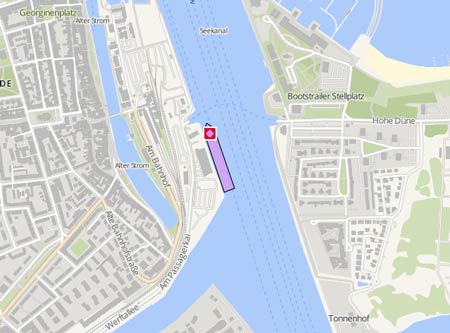SIR JOHN FRANKLIN
Course/Position
Latest ports
Latest Waypoints
Latest news
Coast Guard closely monitoring problems of new vessels
The Canadian Coast Guard was closely monitoring problems affecting components on all three of its new offshore fisheries science vessels. Two different components — a propulsion shaft tube and valves controlling seawater intake — have needed repair or replacement on the 'Sir John Franklin', 'Capt. Jaqques Cartier' and 'John Cabot'. The problems included corrosion, premature wear or mislabelling. The failure of a third component — a switch that controls motor speed — caused a fire on board the B 'John Franklin'' and led to a stop-sail order from independent inspectors working on behalf of Transport Canada Marine Safety. The defective controller was found to be an isolated incident. The Seaspan Shipyard in Vancouver built the ships at a cost of $778 million as part of the National Shipbuilding Strategy. The ships entered service between 2019 and 2021, providing fisheries science and monitoring in the Pacific and Atlantic. The forward and aft propulsion shaft stern tube bearings allow the propeller to turn smoothly. The part has been repaired on the 'Sir John Franklin' and and 'John Cabot' which was the newest of the fleet and based in St. John's. Halifax-based 'Capt. Jacques Cartier' will be pulled out of the water in April for a refit, Its propeller shaft tube bearings will be replaced. The tender closes next week. There were signs of premature bearing wear. Seawater piping and valve failures required part replacements on all three ships. That work has been completed. There was a report with various potential causes identified, including fluid flow rates, dissimilar metals (galvanic corrosion), and mislabelled valves. The ships have a one-year warranty after delivery. Only the 'John Cabot' was still under warranty when Seaspan repaired its stern tube bearings in January 2022. The 'Sir John Franklin' was in dry dock for other items in fall 2021 and had its stern tube bearings repaired as additional work at a cost of $410,978.53. Although the propulsion variable frequency drives fell under an extended material and workmanship warranty, the failure ccurred after that warranty had expired. The starboard variable frequency drive was repaired during the $2.4-million refit. Upon investigation, it was determined that the mechanism of failure was extremely rare and there was no evidence to suggest that the same issue existed on the other two vessels. When the refit was completed in December, the stop-sail order was lifted by the American Bureau of Shipping, which provides regulatory inspections. The ship returned to service in January.
Softwarer glitch responsible for damage in November
A software malfunction was being blamed for damaging a critical piece of equipment on board the 'Sir John Franklin'. THe spooling gear on the starboard trawl winch took off on its own. The winch is used to retrieve heavy gear and nets deployed to gather ocean climate data and fish stocks on board the vessel. The damaged part will be replaced and the winch repaired when the ship heads into planned maintenance in February 2020. At the time of the malfunction, no personnel was in the vicinity. An official with the Union of Canadian Transportation Employees said the malfunction occurred in the middle of the night during a patrol in November 2019. The shipyard was aware of the issue and is taking responsibility and will complete the repairs under warranty
Seaspan Shipyards Delivers First Offshore Fisheries Science Vessel To Canadian Coast Guard
Seaspan Shipyards (Seaspan) and the Government of Canada celebrated the official handover of the first Offshore Fisheries Science Vessel (OFSV), the CCGS Sir John Franklin to the Canadian Coast Guard (Coast Guard). An official handover ceremony took place aboard the vessel attended by the Minister of Fisheries, Oceans and the Canadian Coast Guard, senior officials from the Coast Guard, Seaspan and supply chain partners. Designed and built by Seaspan, the 63.4m OFSVs are one of the most complex ships of their size and type. Specifically designed to meet the needs of the Canadian Coast Guard and scientists, these vessels feature a variety of innovative systems including high-tech fishing trawls, laboratories and a deployable drop keel. The vessels will serve as a platform for Fisheries and Oceans Canada scientists to monitor the health of fish stocks, better understand the impacts of climate change and support oceans research.
Upload News

